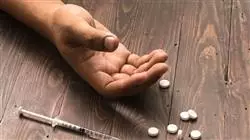University certificate
The world's largest faculty of psychology”
Introduction to the Program
This program provides a complete overview of addictions, analyzing their global situation, delving into the neurobiology of each one of them and proposing the best therapeutic strategies derived from the cognitive-behavioral approach"

The phenomenon of drug dependence and addictions to different substances is a global public health problem that cannot be understood from a single perspective. Aspects such as the individual's standard of living, their educational possibilities and the context in which they develop usually have a direct impact on the development of these pathologies. However, this is not the only thing that takes sides in these cases, which makes their classification, approach and correct choice of treatment even more difficult.
At this juncture, cognitive-behavioral therapy offers an unprecedented space to rehabilitate the addicted patient through a certain regimen of routines and a correct follow-up. In this sense, and thanks to this therapeutic approach, a precise analysis of what the individual wants to do and what they actually do is achieved. Making them aware of the repercussions of their actions and encouraging a more solid rehabilitation.
But as cognitive-behavioral therapy has established itself as a truly effective approach to addiction, its perspectives, research and resources have also grown. For this reason, and in order to face this reality, it is necessary for the psychologist to keep up to date in order to be able to apply all these novelties to their daily practice, thus being able to make a more effective analysis of the biopsychosocial conditions that affect the patient and to choose the therapeutic strategies in a more precise way.
Being fully aware of this reality, TECH has designed this Master’s Degree where, throughout 1500 hours of intensive study, a complete tour of the latest postulates in the classification of addictions will be made, as well as the different approaches for each of them (alcohol, tobacco, games, drugs, etc. following the strategies proposed by cognitive-behavioral therapy.
A unique university program that focuses on telepractice to update the psychologist's knowledge in a much more efficient way and that, being taught in 100% online mode, allows the professional to continue updating their knowledge without having to give up their work and/or personal activities. All this, under the seal of quality and academic prestige of the largest digital university in the world, the TECH hallmark.
Be at the forefront of your field by incorporating the most recent and effective approaches to addiction treatment into your daily practice. This is the opportunity you've been waiting for to take your career a step further"
This Master's Degree in Cognitive-Behavioral Treatment of Addictions contains the most complete and up-to-date scientific program on the market. The most important features include:
- Practical cases presented by experts in Cognitive-Behavioral Psychology
- The graphic, schematic, and practical contents with which they are created, provide scientific and practical information on the disciplines that are essential for professional practice
- Practical exercises where the self-assessment process can be carried out to improve learning
- Its special emphasis on innovative methodologies
- Theoretical lessons, questions to the expert, debate forums on controversial topics, and individual reflection work
- Content that is accessible from any fixed or portable device with an Internet connection
A Master's Degree 100% online that allows you to update your knowledge without giving up the rest of your daily activities. And all this with the best pedagogical methodology in online teaching"
The program’s teaching staff includes professionals from sector who contribute their work experience to this training program, as well as renowned specialists from leading societies and prestigious universities.
The multimedia content, developed with the latest educational technology, will provide the professional with situated and contextual learning, i.e., a simulated environment that will provide immersive knowledge programmed to learn in real situations.
This program is designed around Problem-Based Learning, whereby the professional must try to solve the different professional practice situations that arise throughout the program. For this purpose, the student will be assisted by an innovative interactive video system created by renowned and experienced experts.
With this program you will be trained to make a much more precise approach to each type of addiction based on the strategies offered with cognitive-behavioral therapy"

Thanks to its completely up-to-date content, you will get up to date to address the comorbidities of addictions with other pathologies in a much more efficient way"
Why study at TECH?
TECH is the world’s largest online university. With an impressive catalog of more than 14,000 university programs available in 11 languages, it is positioned as a leader in employability, with a 99% job placement rate. In addition, it relies on an enormous faculty of more than 6,000 professors of the highest international renown.

Study at the world's largest online university and guarantee your professional success. The future starts at TECH”
The world’s best online university according to FORBES
The prestigious Forbes magazine, specialized in business and finance, has highlighted TECH as “the world's best online university” This is what they have recently stated in an article in their digital edition in which they echo the success story of this institution, “thanks to the academic offer it provides, the selection of its teaching staff, and an innovative learning method aimed at educating the professionals of the future”
A revolutionary study method, a cutting-edge faculty and a practical focus: the key to TECH's success.
The most complete study plans on the university scene
TECH offers the most complete study plans on the university scene, with syllabuses that cover fundamental concepts and, at the same time, the main scientific advances in their specific scientific areas. In addition, these programs are continuously being updated to guarantee students the academic vanguard and the most in-demand professional skills. In this way, the university's qualifications provide its graduates with a significant advantage to propel their careers to success.
TECH offers the most comprehensive and intensive study plans on the current university scene.
A world-class teaching staff
TECH's teaching staff is made up of more than 6,000 professors with the highest international recognition. Professors, researchers and top executives of multinational companies, including Isaiah Covington, performance coach of the Boston Celtics; Magda Romanska, principal investigator at Harvard MetaLAB; Ignacio Wistumba, chairman of the department of translational molecular pathology at MD Anderson Cancer Center; and D.W. Pine, creative director of TIME magazine, among others.
Internationally renowned experts, specialized in different branches of Health, Technology, Communication and Business, form part of the TECH faculty.
A unique learning method
TECH is the first university to use Relearning in all its programs. It is the best online learning methodology, accredited with international teaching quality certifications, provided by prestigious educational agencies. In addition, this disruptive educational model is complemented with the “Case Method”, thereby setting up a unique online teaching strategy. Innovative teaching resources are also implemented, including detailed videos, infographics and interactive summaries.
TECH combines Relearning and the Case Method in all its university programs to guarantee excellent theoretical and practical learning, studying whenever and wherever you want.
The world's largest online university
TECH is the world’s largest online university. We are the largest educational institution, with the best and widest online educational catalog, one hundred percent online and covering the vast majority of areas of knowledge. We offer a large selection of our own degrees and accredited online undergraduate and postgraduate degrees. In total, more than 14,000 university degrees, in eleven different languages, make us the largest educational largest in the world.
TECH has the world's most extensive catalog of academic and official programs, available in more than 11 languages.
Google Premier Partner
The American technology giant has awarded TECH the Google Google Premier Partner badge. This award, which is only available to 3% of the world's companies, highlights the efficient, flexible and tailored experience that this university provides to students. The recognition as a Google Premier Partner not only accredits the maximum rigor, performance and investment in TECH's digital infrastructures, but also places this university as one of the world's leading technology companies.
Google has positioned TECH in the top 3% of the world's most important technology companies by awarding it its Google Premier Partner badge.
The official online university of the NBA
TECH is the official online university of the NBA. Thanks to our agreement with the biggest league in basketball, we offer our students exclusive university programs, as well as a wide variety of educational resources focused on the business of the league and other areas of the sports industry. Each program is made up of a uniquely designed syllabus and features exceptional guest hosts: professionals with a distinguished sports background who will offer their expertise on the most relevant topics.
TECH has been selected by the NBA, the world's top basketball league, as its official online university.
The top-rated university by its students
Students have positioned TECH as the world's top-rated university on the main review websites, with a highest rating of 4.9 out of 5, obtained from more than 1,000 reviews. These results consolidate TECH as the benchmark university institution at an international level, reflecting the excellence and positive impact of its educational model.” reflecting the excellence and positive impact of its educational model.”
TECH is the world’s top-rated university by its students.
Leaders in employability
TECH has managed to become the leading university in employability. 99% of its students obtain jobs in the academic field they have studied, within one year of completing any of the university's programs. A similar number achieve immediate career enhancement. All this thanks to a study methodology that bases its effectiveness on the acquisition of practical skills, which are absolutely necessary for professional development.
99% of TECH graduates find a job within a year of completing their studies.
Master’s Degree in Cognitive-Behavioral Treatment of Addictions
The continuous emergence of new addictions, coupled with the evolution and development of their symptomatic profiles, has made the treatment of these pathologies one of the most relevant areas of psychology in recent years. This significant importance has been reflected in the exponential growth of job demand, both in public and private entities, for professionals specialized in the field. Understanding constant academic updating as an indispensable tool for the proper performance of psychologists seeking access to this important occupational niche, TECH Global University has designed our Master's Degree in Cognitive-Behavioral Treatment of Addictions. This postgraduate program will place particular emphasis on the development of new treatment and psychological intervention pathways for patients with internet and new technology addiction. Additionally, it will delve into the modernization of the following aspects: understanding the various cognitive-behavioral treatment techniques used in the care of patients with psycho-stimulant addiction; and the elements and specifics to consider when planning a cognitive-behavioral treatment process for a patient with opioid addiction.
Study an online Master's Degree in Cognitive-Behavioral Treatment of Addictions
The numerous factors, elements, contexts, situations, and aspects that influence the potential success of a psychological treatment process for patients with addictions make this sector one of the most demanding in terms of expertise, preparation, and knowledge required of its specialized professionals. In our Master's program, you will explore the knowledge of new trends, methodologies, and protocols that set the standard for modern cognitive-behavioral treatment processes for addictions. In this way, the program prioritizes the updating of the following concepts: new protocol alternatives in assessing the severity of conditions in patients with substance addiction; and understanding the different cognitive-behavioral treatment processes to be implemented in patients with alcohol addiction.







